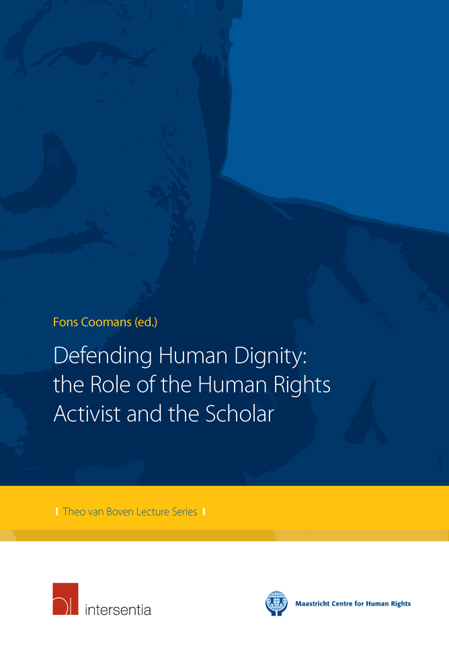Book contents
- Frontmatter
- Contents
- Miscellaneous Frontmatter
- 5th Annual Theo van Boven Lecture
- Defending Rights: Human Rights Defenders in the Front Line
- 6th Annual Theo van Boven Lecture
- Slavery and the Human Rights Scholars
- The Politics of Human Rights: Slavery and the Sustainable Development Goals
- Miscellaneous Endmatter
6th Annual Theo van Boven Lecture
Published online by Cambridge University Press: 27 September 2018
- Frontmatter
- Contents
- Miscellaneous Frontmatter
- 5th Annual Theo van Boven Lecture
- Defending Rights: Human Rights Defenders in the Front Line
- 6th Annual Theo van Boven Lecture
- Slavery and the Human Rights Scholars
- The Politics of Human Rights: Slavery and the Sustainable Development Goals
- Miscellaneous Endmatter
Summary
Introduction
In 2015 the theme of the annual Theo van Boven lecture was Contemporary Forms of Slavery. This is a current problem today, not only in developing countries, but also in developed countries all over the world. One may think of children in African countries who work on cocoa bean plantations, but also involuntary employed domestic workers in the Gulf region and forced prostitution in European countries. The lecture was delivered by Prof. Jean Allain, a renowned international expert on the legal aspects of slavery. In his lecture Prof. Allain focused on the role and responsibility of human rights scholars to address contemporary forms of slavery by studying the legal history of the concept of slavery. The presentation by Prof. Allain was followed by a response from Dr. Aidan McQuade, Director of Anti-Slavery International, a leading human rights NGO. In his reaction Mr. McQuade, from a more practical perspective, dealt with the relationship between contemporary forms of slavery, political power positions, political will and the 2015 UN Sustainable Development Goals.
Prof. Jean Allain holds the Chair in Public International Law at Queen's University, Belfast. He is a generalist in public international law with a specialisation in human rights and is the leading legal expert on issues of slavery and trafficking. He is also the Director of the Human Rights Centre of Queen's University. In 2015, Prof. Allain was appointed Special Adviser to Anti-Slavery International. Prof. Allain's recent publications include: Jean Allain, The Law and Slavery: Prohibiting Human Exploitation, Martinus Nijhoff, 2015, 640 pp.
Dr. Aidan McQuade is Director of Anti-Slavery International, the oldest international human rights organisation in the world, founded in London in 1839, which works to eliminate all forms of slavery around the world. He graduated from Queen's University Belfast with a civil engineering degree and then worked in Ethiopia for Concern and Caritas Switzerland, Médecins Sans Frontières Holland in Afghanistan and Oxfam in Angola before taking up the post at Anti-Slavery International in 2006.
- Type
- Chapter
- Information
- Defending Human DignityThe Role of the Human Rights Activist and the Scholar, pp. 19 - 20Publisher: IntersentiaPrint publication year: 2016



